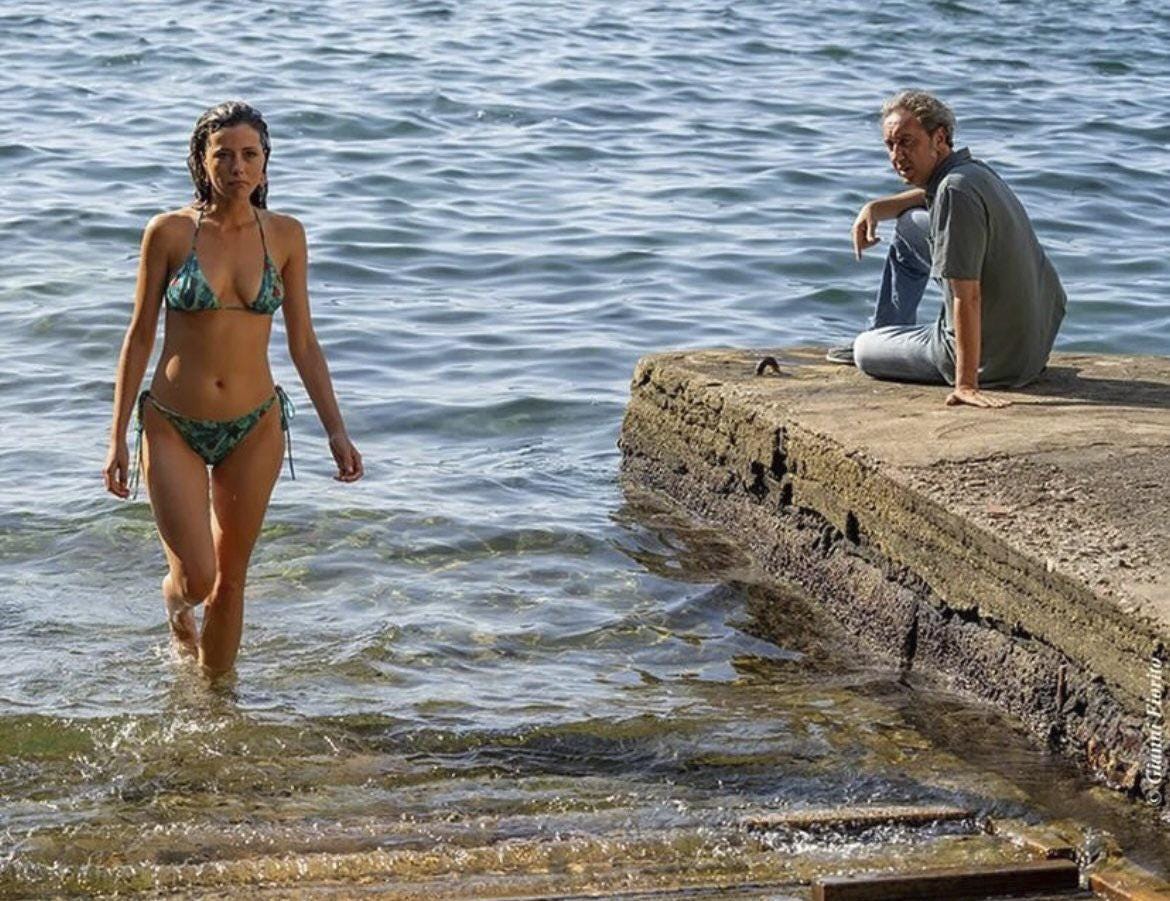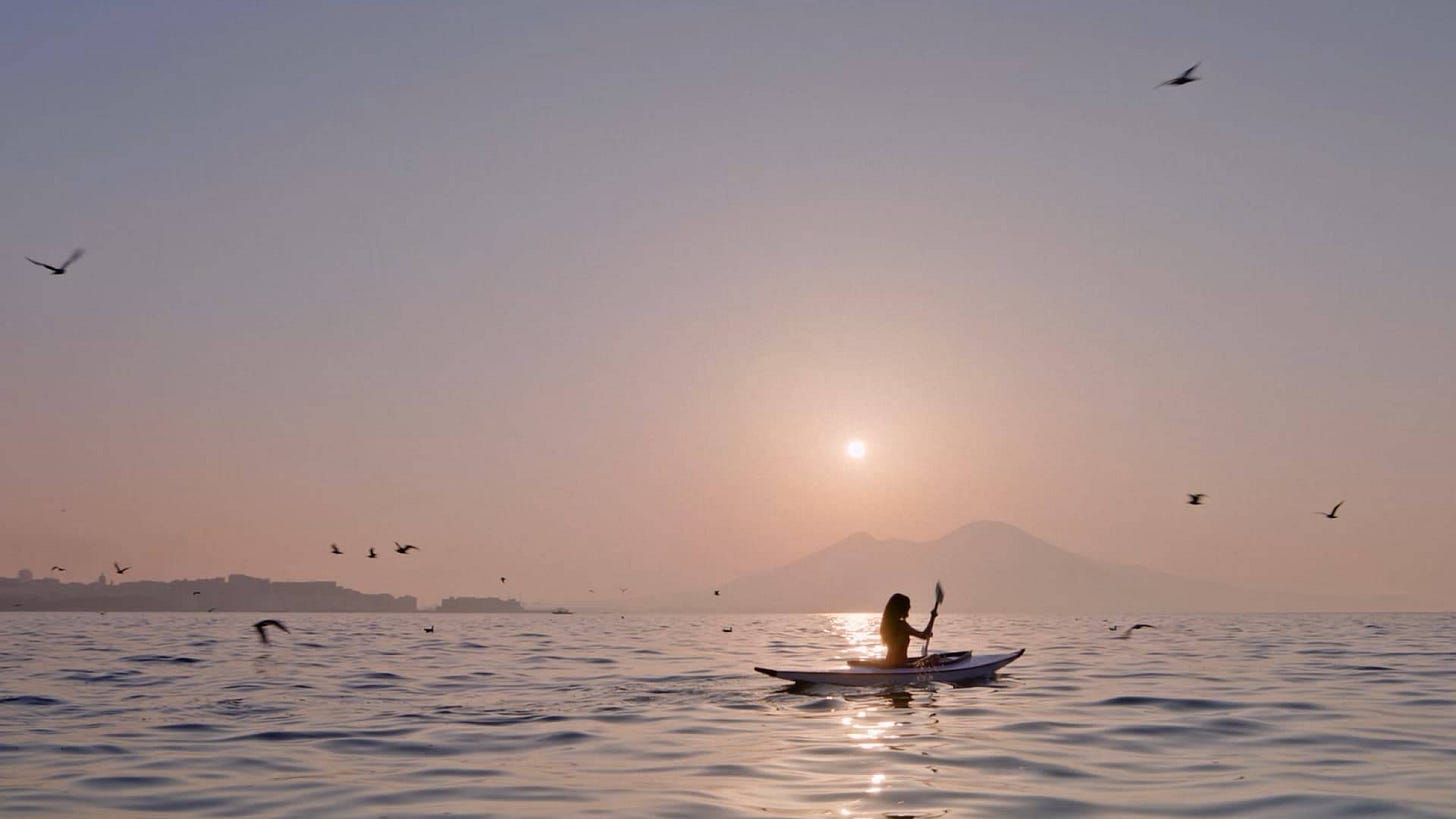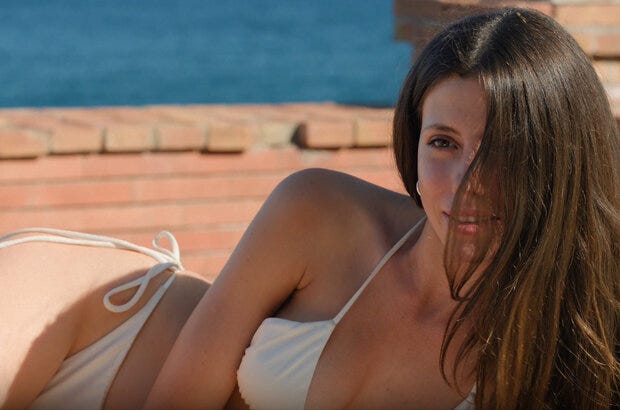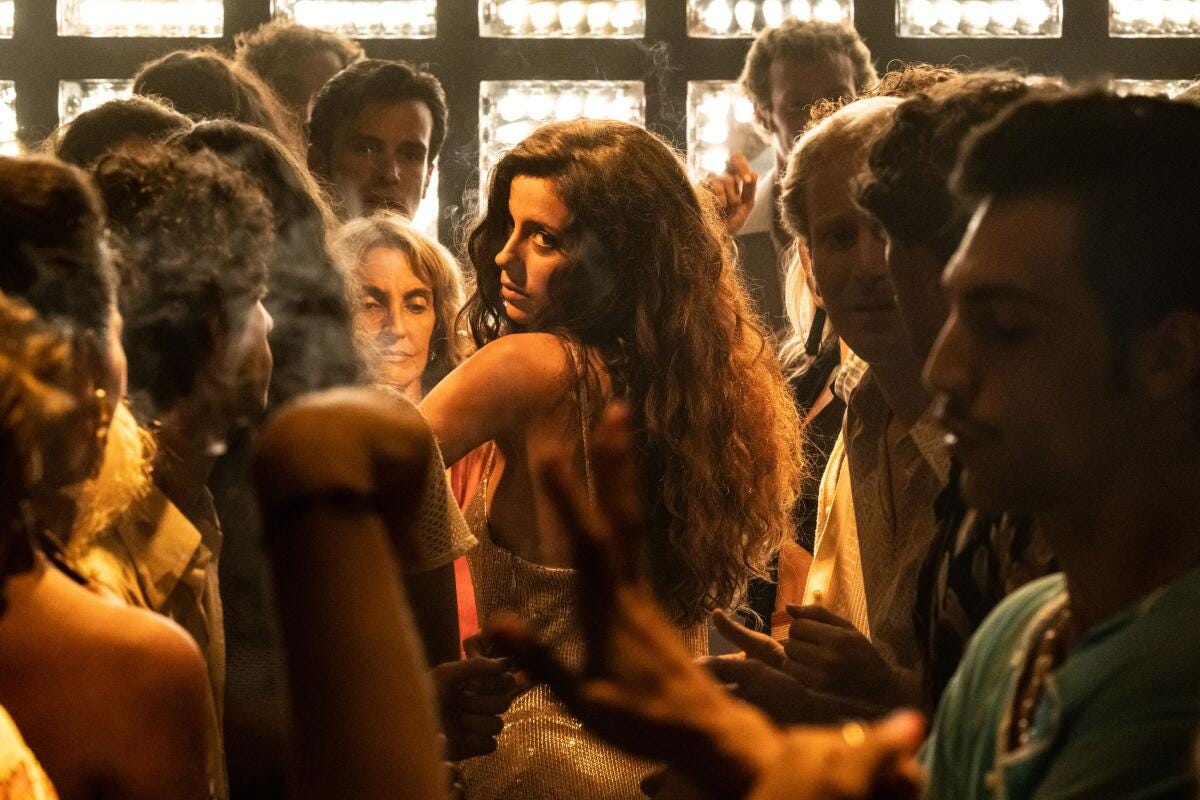Listen, I am a Sorrentino apologist. I am willing and ready to forgive a lot of his sins, because sometimes he will frame a shot so well that I can taste the sea air, or smell the swallow shit in Rome. I like his lush, stupid imagery. I enjoy the painful, elevated monologues. That conversation in The Great Beauty where Jep slices down his friend for her hypocrisy is one of my all-time favourite. I even like Youth! Yes that’s right, I think Paul Dano in the Hitler costume was a masterful flourish. I have admired Sorrentino’s use of Jude Law, Sean Penn, Filippo Scotti, Tony Servillo. I don’t care if it’s sexist, I would think, because at least it is trying to be audacious and beautiful and interesting.
I can defend almost anything Sorrentino does — oh, but I can’t defend Parthenope.
My issue is with the movie’s script and character work, rather than any technical issues. Sorrentino is obviously incredibly accomplished, and has a cinematic language of his own that I lack the expertise to comment on. Your attachment to his visuals usually comes down to your capacity for flamboyance. I like flamboyance; I like his long, languorous shots, suffused with sensual detail.
The problem is Parnethope herself: the unknowable, titular sun which the movie orbits around. She is born in the waters of Posillipo, Naples, in 1950 — a birth which suggests, lightly, the cracks that her family will someday bear. Her older brother Raimondo and the maid’s son Sandrino watch on curiously. The scene is soaked in light and salt. It is so beautiful. For a moment I think this will be a very good movie.
Parthenope is of course literally Naples — she shares her name with a siren from Homer’s Odyssey. After failing to seduce him, she washed sadly ashore on the island of Megaride, and served as the titular city for the people of Cumae. She has been the subject of operas, plays, and music. She has charmed Virgil, Melville, and Manuel de Zumaya. Now we may add to that list Paolo Sorrentino.
In that spirit, Parthenope’s godfather is Achille Lauro, a real-life business man and member of the Fascist party. He brings her a carriage for a bed, on which she sleeps for the rest of her childhood and adolescence. Sorrentino, though, does not waste much time on Parthenope’s time as a little girl, because then she wouldn’t be fuckable, which is the point of this movie. Okay, he would probably say the point of this movie is the feminine mystique — the ineffable melancholic quality that she exudes, just like the city itself — but that is wrong.
The film really picks up in 1970, when Parthenope is twenty. She climbs out of the sea in a bikini, dripping water, torturing Sandrino. By this time, Parthenope has a laughing, faraway gaze, and incredible tits. Parthenope — you must understand this — is blindingly hot. She is so hot that a billionaire sees her from his helicopter and harasses her to go for dinner with him. She is so hot that her own brother wants to fuck her so badly that he goes insane and then kills himself. This is her fault, somehow, of course. Later, at the unspeakably geriatric age of 34, she is so hot that a cardinal has sex with her and this triggers the miracle of San Gennaro.
What is she, beyond being hot? Sorrentino wants us to know that she is smart, an anthropologist. In an early scene, during an oral exam, she derails the entire thing by repeatedly insisting that her professor, a stiff and ill-tempered man called Marotta, tell her what anthropology is. He doesn’t have an answer that pleases her.
After her brother’s death, Sorrentino would have us believe that she is depressed. This is more convincing, thanks only to Celeste Dalla Porta, who ekes from the thin script a frankly impressive depth of feeling. In one bizarre scene, she visits acting coach Flora Malva, who is so insecure about her botched face that she won’t reveal it. ‘Never display your photos,’ Malva tells the very sad Parthenope. ‘Even beauty, don't count on it. It charms for the first ten minutes and irritates for the next ten years.’
Hmm. Does it? Later they kiss in the shower at Malva’s behest. It should be noted that she also has very nice tits.
Parthenope collides with a washed-up self-hating Neapolitan actress, the fantastically-named Greta Cool, who crashes out at boat party, insults her hosts, and then tells Parthenope she doesn’t have what it takes to be an actress. That night, Parthenope fucks a mafioso after watching probably the most ill-conceived sequence of the entire movie, in which two young people are forced to have sex in front of a bunch of passive onlookers in a bid to create the next heir to the Camorra families.
The problem with Parthenope being smart is that we never see her write, or work in any meaningful way. We are told she is brilliant, but her thesis sounds like it kind of sucks. We are told she is a good academic, but it’s never shown. She returns to university to study under Marotta. She gets pregnant and then aborts it. She breaks up with Sandrino for good. What does Parthenope — an ostensibly intelligent, sensitive woman — think about all this? She is only permitted to grin impishly and sway around on screen, impenetrable.
Okay, you are thinking. Well at least there is some hot sex. No! You are wrong! There is no hot sex! ‘Don't you find desire a mystery and sex its funeral?’ Parthenope asks at one point. This is the movie’s attitude too — it needs us to desire her, and worries that the physical act of sex will destroy this desire, because we will get too close to her.
In fact, the movie is actually quite weird and condescending about Parthenope’s body in general. We get her long legs, her torso, but very little nudity otherwise. Disappointing! She needs to be beautiful in the same way a statue is beautiful; because we cannot touch her. We get a couple of shots of her in flagrante, all very modest, but her own desire is a blank slate. She comes alive only under the lustful gaze of others, who are mostly men. It goes without saying that she does not ever appear to have an orgasm.
This movie just does not fucking stop. There is John Cheever — a slurring Gary Oldman having the time of his life. There is a massive baby-man. There is that aforementioned cardinal, a disgusting, sweaty conman, who dresses Parthenope in church regalia before she acquiesces to hysterically sacrilegious sex. It’s all so luciously beautiful — these landscapes! Those colours!
The older Parthenope gets, the more interesting she becomes, but the movie does not know what to do with a woman it doesn’t lust after so totally. Parthenope has no friends. Parthenope has no family, save for Marotta, who becomes a quasi father-figure. She must be so lonely. Is Naples lonely? Is that the point? I bought Jep Gambardella as the soul of Rome because he is so well-drawn; because he swirls in and out of the city, colliding with characters just as interesting as him. Jep is afforded a personality because he is allowed to be ugly, not only in appearance but thought and action. He is allowed an interiority that makes the movie’s indulgent flourishes meaningful.
For that matter, even the washed-up stripper seductress in The Great Beauty is afforded a level of consideration that Parthenope is not. Fuck, at least she dies. That’s something. That’s better than just floating around the narrative because your main job is to have things happen to you.
Parthenope makes me angry, because sometimes it’s almost good. It’s almost good when that billionaire tells her she’s not smart after she says no to sex. It’s almost good when Cheever refuses her offer of a walk because he doesn’t want to steal even a minute of her youth from her. It’s almost good when Parthenope and Marotta talk to each other like human beings, and it’s especially almost good when the denizens of Naples flood out to see her and the mafioso as the fireworks explode in the background. There’s a compelling story buried in here somewhere, I am sure of it, which is why it’s so frustrating when Sorrentino can’t find it.
This is most evident in Parthenope’s ending, which skips forward to 2023, when Parthenope is 73. She is a celebrated anthropologist, and her students adore her. Yet she has no children, no family. Robbed of her beauty, she is an object of pity, this old woman. She retires and goes home to Naples. I find her incredibly alluring in this state, not that much older than Jep Gambarella. Why couldn’t we see an older Parthenope? Why couldn’t the movie see her aged self as an equally engaging subject? Does her loss of sexual appeal mean that Sorrentino can’t do anything but feel vaguely sorry for her?
Probably! Not to sound all 2020, but I am begging men to force themselves to envision a world in which a woman is not defined by her youth and beauty. I am begging them to envision a world in which a woman’s ageing is just as matter-of-fact as a man’s; it robs no integral worth or fascination from her. Maybe she doesn't mind it, actually! Maybe she can be the main character of a movie even if her tits are the tits of someone in their seventies.
Just like its protagonist, Parthenope is beautiful and empty and ultimately unknowable. Maybe this is a reflection of Naple’s ever-shifting reality; its storied and dirty and ancient history. The only vaguely original dialogue is delivered by Greta Cool:
‘You see, the problem is not that this statue is ugly. The problem is you Neapolitans. You are depressed and you don't know it. You walk arm in arm with horror and you don't know it. You are just sloppy and folkloristic. Everyone laughs at you and you don't realize it. You boast of being clever. But what have you gained from all this cleverness? You are poor, cowardly, whiny, backward. You steal and act badly. You are always ready to throw the cross on someone else. The invader of the moment, the corrupt politician, the unscrupulous property developer. But the disgrace is you.’
I don’t know. At the end of The Great Beauty, I emerged knowing something more of Rome, but Parthenope tells me nothing of its purported two subjects: Naples and womanhood. Oh, I can imagine men saying, as they have done for centuries. Who can know what goes on in the mind of woman? Clearly not Paolo Sorrentino. Ladies, pick up your pencils.
I am reading Tamarisk Row by Gerald Murnane. Genuis, but only can be imbibed in small sittings.
I am listening to the Carrie & Lowell reissue
I am watching The Age of Innocence (1993) — what a balm!











Great article. I watched this movie twice. Not that it was that great, but, the cinematography was crazy good. It got weird when she fucked the cardinal, then, the man-baby made no sense. The incest was a little odd…All in all, it was a great perfume ad with beautiful people flirting inappropriately.
I can't believe I forgot about the giant baby man 😩😭I didn't hate it bc I am also a Sorrentino apologist. Also as a football fan I was charmed by the scenes at the end of people in the streets after Naples won the Serie A title. But my final thoughts were definitely along the lines of "not great bob!!"